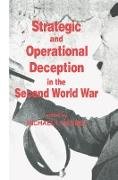First Published in 1987. New information obtained from the declassification of Ultra intercepts and other Second World War documents as well as from recent scholarly research has credited Allied deception operations with an even more important contribution to winning the war than was previously supposed. Yet deception is only one factor in the achievement of victory; it cannot guarantee success. It must be fully understood and exploited by the highest levels of command. Most histories of deception operations during the Second World War have focused on those that were successful. Instances in which deception operations failed to achieve their objectives are discussed by John Campbell, who describes an early attempt to convince the Germans that the Allies intended to invade at Pas de Calais in the summer of 1943, and by Katherine Herbig, who gives the first detailed description of US deception operations in the Pacific. Klaus-Jurgen Moiier questions the actual effectiveness of deception operations against the Germans. He argues that many successes attributed to the Allies' use of deception were in fact achieved by independent considerations on the German side. Professor Moiier builds a particularly strong case in challenging the success of Operation Fortitude North, in which the Allies tried to divert German troops to Norway before invading Normandy. Although very little is known of Soviet deception operations on the Eastern Front, it must be remembered that they were conducted on a much larger scale than those of either the British in Europe or the Americans in the Pacific. Colonel David Glantz's account of Soviet deception and covert activities offers a version of the historiography of the war between the USSR and Germany which may explain some of the monumental German failures. Tom Cubbage not only contributes a synthesis of the primary and secondary sources available on the deception operations preceding Overlord, but also reviews the so-called Hesketh Report - Fortitude: A History of Strategic Deception in North Western Europe April 1943 to May 1945, Colonel Roger Hesketh's official report on Allied deception operations against the Germans in north-west Europe which was declassified in 1976, yet remains unpublished. It indicates that Professor Muller's suspicions that the Allies over-estimated the impact of Fortitude are unfounded. Edited and with a comprehensive introduction by Michael Handel, these important and original studies put the entire deception effort during the Second World War into a more balanced and accurate perspective.


